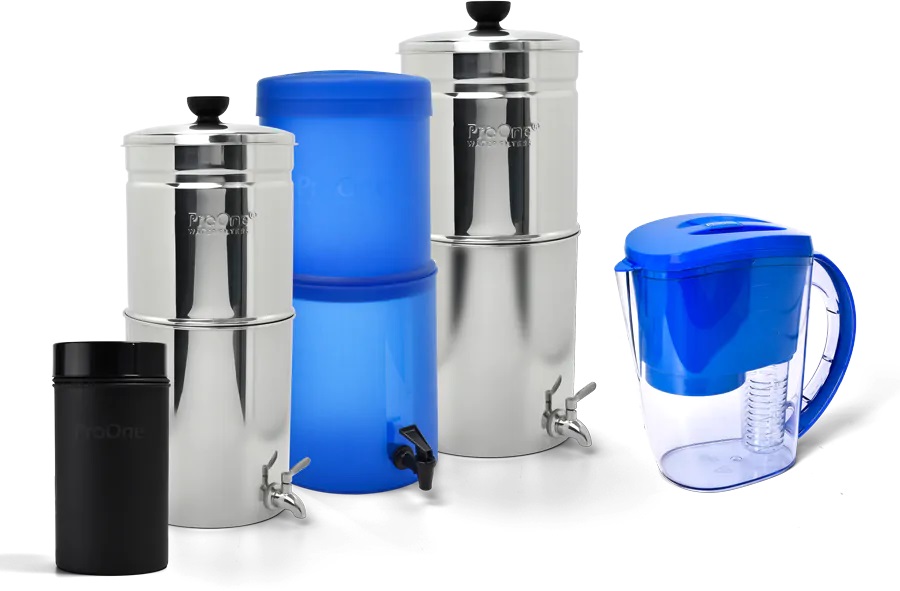In our quest for clean, safe drinking water, we often encounter a variety of filtration methods, each promising to rid our water of impurities. Among these, gravity water filters stand out for their simplicity and effectiveness. But how exactly do they work? Let’s delve into the science behind gravity water filters to understand their mechanism and why they’re a popular choice for ensuring access to clean water.
Understanding Gravity Water Filters:
At its core, a gravity water filter operates on the principle of gravity-driven filtration. Unlike complex filtration systems that rely on electricity or high pressure to force water through a series of membranes or cartridges, gravity filters work naturally, requiring no external power source. This simplicity makes them ideal for various settings, from outdoor adventures to everyday household use.
The Components:
A typical gravity water filter comprises several key components:
- Water Reservoir: This is where the untreated water is poured in.
- Filtration Element: The heart of the system, consisting of one or more filter elements designed to remove contaminants.
- Clean Water Reservoir: Where the filtered water collects after passing through the filtration element.
- Gravity: The driving force behind the filtration process.
The Filtration Process:
Now, let’s break down the filtration process step by step:
- Pouring in Untreated Water: The process begins by pouring untreated water into the top reservoir of the gravity filter. This water may come from a variety of sources, including rivers, lakes, or tap water supplies, depending on the user’s needs and environment.
- Gravity Takes Over: Gravity comes into play once the water is in the reservoir. Gravity pulls the water downward through the filtration element(s) by the force of its weight. This downward flow is crucial for the filtration process to occur.
- Contaminant Removal: Various contaminants are captured and removed as the water passes through the filtration element. The exact mechanism of filtration depends on the type of filter element used. Common filtration media include activated carbon, ceramic, and hollow fibre membranes.
- Clean Water Collection: After passing through the filtration element, the now-clean water collects in the lower reservoir of the gravity filter. This reservoir holds the purified water until it can be dispensed for drinking or other purposes.
Types of Filtration:
Gravity water filters employ different types of filtration mechanisms to remove contaminants from water:
- Physical Filtration: This involves the physical removal of contaminants through a barrier or sieve. Examples include ceramic filters and microfiltration membranes, which trap particles larger than their pore size.
- Chemical Filtration: Chemical filtration utilizes adsorption or chemical reactions to remove impurities from water. Activated carbon filters are commonly used for this purpose, as they can effectively adsorb organic compounds, chlorine, and odours.
- Biological Filtration: Some gravity filters incorporate elements that target biological contaminants such as bacteria, protozoa, and viruses. These filters often use a combination of physical and chemical mechanisms to neutralize or remove pathogens.
Advantages of Gravity Water Filters:
Gravity water filters offer several advantages over other filtration methods:
- No Electricity Required: Since they operate solely on gravity, these filters do not require electricity or batteries, making them suitable for use in off-grid locations or during power outages.
- Portability and Convenience: Their lightweight and portable design makes gravity filters ideal for outdoor activities such as camping, hiking, and travel.
- Cost-Effectiveness: Gravity filters are often more affordable than complex filtration systems in terms of initial cost and maintenance expenses.
- Minimal Maintenance: With fewer moving parts and no electricity, gravity filters require minimal maintenance, usually limited to periodic cleaning of the filtration elements.
Conclusion:
In conclusion, gravity water filters offer a simple yet effective solution for obtaining clean, safe drinking water. By harnessing the power of gravity and employing various filtration mechanisms, these filters remove contaminants and impurities, ensuring that the water we consume is of the highest quality. Whether used in outdoor adventures or as part of a household water purification system, gravity filters are vital in providing access to clean water worldwide.





